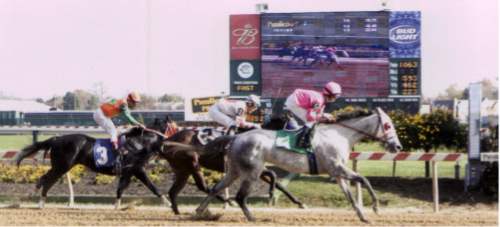Hemp Farmers Act of 2018:
(a) Extension.—Section 1444 of the National Agricultural Research, Extension, and Teaching Policy Act of 1977 (7 U.S.C. 3221) is amended—
(1) in subsection (a), by adding at the end the following:
“(5) FISCAL YEAR 2019, 2020, 2021, OR 2022.—In addition
to other amounts authorized to be appropriated to carry out this section, there are authorized to be appropriated for 1 of fiscal year 2019, 2020, 2021, or 2022 such sums as are necessary to ensure that an eligible institution receiving a distribution of funds under this section for that fiscal year receives not less than the amount of funds received by that eligible institution under this section for the preceding fiscal year.”; and
(2) in subsection (b)—
(A) in the undesignated matter following paragraph (2)(B)—
(i) by striking “paragraph (2) of this subsection” and inserting “this paragraph”; and
(ii) by striking “In computing” and inserting the following:
“(C) In computing”;
(B) in paragraph (2)—
(i) in subparagraph (B), by striking “Of the remainder” and inserting “Except as provided in paragraph (4), of the remainder”; and
(ii) by striking “(2) any funds” and inserting the following:
“(3) ADDITIONAL AMOUNT.—Any funds”;
(C) in paragraph (1)—
(i) by striking “are allocated” and inserting “were allocated”; and
(ii) by striking “; and” and inserting “, as so designated as of that date.”;
(D) by striking “(b) Beginning” in the matter preceding paragraph (1) and all that follows through “any funds” in paragraph (1) and inserting the following:
“(b) Distribution Of Funds.—
“(1) IN GENERAL.—Funds made available under this section shall be distributed among eligible institutions in accordance with this subsection.
“(2) BASE AMOUNT.—Any funds”; and
(E) by adding at the end the following:
“(4) SPECIAL AMOUNT FOR FISCAL YEAR 2019, 2020, 2021, OR 2022.—
“(A) IN GENERAL.—Subject to subparagraph (B), for 1 of fiscal year 2019, 2020, 2021, or 2022, if the calculation under paragraph (3)(B) would result in a distribution of less than $3,000,000 to an eligible institution that first received funds under this section after the date of enactment of the Agricultural Act of 2014 (Public Law 113–79; 128 Stat. 649) for a fiscal year, that institution shall receive a distribution of $3,000,000 for that fiscal year.
“(B) LIMITATION.—Subparagraph (A) shall apply only if amounts are appropriated under subsection (a)(5) to ensure that an eligible institution receiving a distribution of funds under this section for fiscal year 2019, 2020, 2021, or 2022, as applicable, receives not less than the amount of funds received by that eligible institution under this section for the preceding fiscal year.”.
(b) Research.—Section 1445 of the National Agricultural Research, Extension, and Teaching Policy Act of 1977 (7 U.S.C. 3222) is amended—
(1) in subsection (a), by adding at the end the following:
“(6) FISCAL YEAR 2019, 2020, 2021, OR 2022.—In addition to other amounts authorized to be appropriated to carry out this section, there are authorized to be appropriated for 1 of fiscal year 2019, 2020, 2021, or 2022 such sums as are necessary to ensure that an eligible institution receiving a distribution of funds under this section for that fiscal year receives not less than the amount of funds received by that eligible institution under this section for the preceding fiscal year.”; and
(2) in subsection (b)—
(A) in paragraph (2)—
(i) by adding at the end the following:
“(D) SPECIAL AMOUNT FOR FISCAL YEAR 2019, 2020, 2021, OR 2022.—
“(i) IN GENERAL.—Subject to clause (ii), for 1 of fiscal year 2019, 2020, 2021, or 2022, if the calculation under subparagraph (C) would result in a distribution of less than $3,000,000 to an eligible institution that first received funds under this section after the date of enactment of the Agricultural Act of 2014 (Public Law 113–79; 128 Stat. 649), that institution shall receive a distribution of $3,000,000 for that fiscal year.
“(ii) LIMITATION.—Clause (i) shall apply only if amounts are appropriated under subsection (a)(6) to ensure that an eligible institution receiving a distribution of funds under this section for fiscal year 2019, 2020, 2021, or 2022, as applicable, receives not less than the amount of funds received by that eligible institution under this section for the preceding fiscal year.”;
(ii) in subparagraph (B), by striking “(B) Of funds” and inserting the following:
“(C) ADDITIONAL AMOUNT.—Except as provided in subparagraph (D), of funds”;
(iii) in subparagraph (A)—
(I) by striking “are allocated” and inserting “were allocated”;
(II) by inserting “, as so designated as of that date” before the period at the end; and
(III) by striking “(A) Funds” and inserting the following:
“(B) BASE AMOUNT.—Funds”; and
(iv) in the matter preceding subparagraph (B) (as so designated), by striking “(2) The” and all that follows through “follows:” and inserting the following:
“(3) DISTRIBUTIONS.—
“(A) IN GENERAL.—After allocating amounts under paragraph (2), the remainder shall be allotted among the eligible institutions in accordance with this paragraph.”;
(B) in paragraph (1), by striking “(1) Three per centum” and inserting the following:
“(2) ADMINISTRATION.—3 percent”; and
(C) in the matter preceding paragraph (2) (as so designated), by striking “(b) Beginning” and all that follows through “follows:” and inserting the following:
“(b) Distribution Of Funds.—
“(1) IN GENERAL.—Funds made available under this section shall be distributed among eligible institutions in accordance with this subsection.”.
A message from Vince Sanders:
“Dear Friends,
Many of you have expressed concern over the recent DEA ruling that
intends to schedule all Cannabis extracts and cannabinoids as Schedule 1 drugs.
FACT:
The DEA does not have the authority to change or make laws.
This role is reserved strictly for Congress.
The 2014 Farm Bill emphatically mandates that industrial hemp grown as part of state sanctioned pilot programs is exempted from the Controlled Substance Act and that federal agencies (such as the DEA) are prohibited from interfering with pilot programs and/or the interstate sale or transport of hemp products.
Importantly, and aside from the issue of legality and the Constitutional separation of powers, Congress has expressly forbidden any Federal funds from being used to “prohibit the transportation, processing, sale or use of industrial hemp that is grown or cultivated in accordance with section 7606 of the Agricultural Act of 2014, within or outside the State in which the industrial hemp is grown or cultivated”–Section 763 of the Omnibus Appropriations Act of 2016 (Pt. 114-113) passed on December 18, 2015 (“the Funding Act”). Unless and until this provision lapses and is not renewed, the DEA and the DOJ are prohibited from using any Federal funds to enforce any laws (or rules) that would interfere with hemp (or its products) that are lawfully cultivated under state law in accordance with the 2014 Farm Bill. This means that even if the DEA’s new ruling was lawful, they can’t enforce it. The 9th Circuit Court of Appeals ruled that the DOJ was prohibited from using Federal funds to interfere with a State’s medical marijuana program by prosecuting state compliant medical marijuana users based on a similar funding clause — USA v. McIntosh, 833 F.3d 1163 (9th Cir. Cal. 2016) (“McIntosh”)
In addition, since the 9th Circuit Court of Appeals ruling in the US Hemp Association vs. DEA, it is legal to import foreign grown hemp products.
Please help to secure passage of the Industrial Hemp Farming Act in the next Congress, a step which would once and for all remove any ambiguity and de-schedule CBD and other non-psychoactive cannabinoids.
Ask your representative to co-sponsor house bill “H.R.1635”: http://www.house.govirepresentatives
Ask your senators to co-sponsor the senate companion bill “S.1333”:
http://www.senate.govigeneral/contactinformationisenators_cfm.cfm
Please continue to educate friends and family about the life changing benefits of non-psychoactive cannabinoids and request that they also contact their Congressmen and women.

